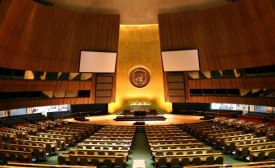australia
Some argue that when we talk of exporting Australian arts to Asia, we ought to be talking only of their role in soft diplomacy: that is, assisting Australia's political and economic agenda.....The implication is that the arts in Asia should not be valued on their own terms.
Though the corporate figures often come to stand as symbols for Western political and media imperialism, state‐sponsored media organisations exist as direct mouthpieces for that nation’s ideology. In official rhetoric this strategy is referred to as ‘public diplomacy’.
“This stands in contrast to tourist images of the city, which often focus on the large population and the ‘mass humanity' one encounters in China's capital. I wanted to focus not so much on the city itself, but on residents and their way of life, and images by people who live and work in Beijing.”

The USC Center on Public Diplomacy was pleased to host Caitlin Byrne (CPD Research Fellow 2010-2012) who discussed her research project, "Public Diplomacy and the United Nations Security Council: Securing a Seat at the Top Table."
True public diplomacy differs because it has a broader reach, it goes beyond the influential few to the masses, it seeks out a new audience and encourages the communities overseas to adopt a positive and open outlook. This is vitally important for a small country like Australia.
If the BCCI gets together with the ministry of external affairs, the potential for track two, or 'doosra' diplomacy can be exploited to the fullest with countries with whom we have outstanding issues. The 'doosra' may well prove more productive than the mainstream efforts of our envoys because it appeals directly to the masses.
“Cultural diplomacy” has a nice ring to it; it brings to mind folk singing, dances around the Maypole, children’s finger-painting exhibitions, and other such feel-good exports that can make even global adversaries think kindly of each other, at least momentarily.
LONDON --- “Cultural diplomacy” has a nice ring to it; it brings to mind folk singing, dances around the Maypole, children’s finger-painting exhibitions, and other such feel-good exports that can make even global adversaries think kindly of each other, at least momentarily.







